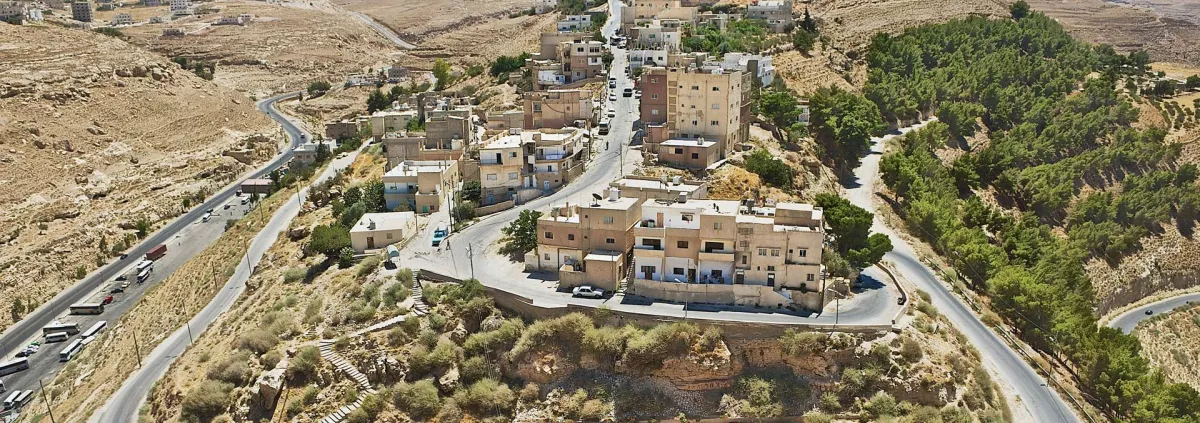Implementation of Sustainable Energy & Climate Action Plan in Karak municipality
Overview
In line with the Nationally Determined Contribution (NDC) of Jordan for 2030, Karak municipality has committed to a 14% reduction of the municipality’s greenhouse gases (GHG) emissions with an aim to counteract climate change. Besides the capital city Amman, Karak municipality is the first municipality in Jordan to construct renewable energy projects and is committed to a sustainable future for the city. This objective is expressed through the actions agreed upon in the city’s Sustainable Energy & Climate Action Plan (SECAP), focusing not only on reducing the energy consumption through energy efficiency, or producing more clean energy, but also on improving the existing infrastructures in the city.

Background
Karak is a growing municipality that has witnessed a significant increase of its population over the past years. This trend poses significant pressures on the existing municipal infrastructure and sustainable development of the city. The municipality’s main development challenges include limited natural resources and a slow economy. In addition, Karak faces problems in the escalating energy bill that mounts to about 2.5 million euros annually and represents about 10-15% of the municipality’s annual budget. To address this challenge, Karak Municipality has developed a plan of using sustainable energy and actions for climate change mitigation. It has approved its SECAP in July 2016 as part of the "Cleaner and Energy Saving - Mediterranean Cities" (CES-MED) project, that is funded by the European Union and in collaboration with the Royal Scientific Society on Jordan. The SECAP included conducting energy audits/calculations for the energy requirements which revealed that the highest energy consumer is the residential sector, followed by the Tertiary sector and Private Transport, while the municipal sector consumptions are the lowest. To improve energy efficiency and expand the use of renewable energy sources within its boundaries, the municipality has signed the Covenant of Mayors for Climate & Energy.
Objectives
The plan for the sustainable use of energy in Karak municipality aims to reduce the rate of Greenhouse Gases emissions by 14% by 2020 (short-term) and 40% by 2030 (long-term) through adopting renewable energy resources and implementing energy efficiency measures.
Activities
The plan has addressed the following themes and actions:
- Green building initiatives: refurbishment of municipal buildings to achieve energy efficiency.
- Energy-efficient Street Lighting: 14,000 units will be replaced with LED units by the end of July 2021.
- Installation of 3MWp PV station to generate renewable energy, that is estimated to cover around 55% of the municipality’s electricity consumption. Besides a contribution of the contribution of the Ministry of local administration, the project will be implemented via a Public Private Partnership, in which the partner from the private sector will engage in a Design Build Operate and Transfer (DBOT). The project has a lifespan of 30 years and will lead to annual savings of 740,000 Euro which mounts to more than 22 million Euros over 30 years. The main stakeholders involved in this project are Karak Municipality, the Electricity Distribution Company-EDCO, Mutah University, Sam Green Power & Hiba Company, and National Electric Power Company-NEPCO.
- Replacing diesel cars and machinery in the municipality with hybrid/electric cars: Installing three electrical vehicles charging stations, located in vibrant urban areas in Karak city. To encourage people to use electrical/hybrid cars, this service is provided free of charge.
- Establishing a training center in collaboration with Mutah University that acts as a knowledge hub and aims at training of technicians from the local community including university students and documenting the work and studies made on renewable energy and energy efficiency.
Effects
- Economic impact: The energy savings of the project resulted in 50,000 Euro monthly savings, which is around 50% of the municipal electrical bill. Savings are estimated to mount to more than 22 Million Euro during the life span of the project (30 years).
- Environmental impact: the project will lead to an annual reduction of 5,520 tons of Co2 emissions.
- Socio-economic impact and gender sensitivity: The project provided (70) temporary and (12) permanent job opportunities for local youth, while ensuring gender balance among the beneficiaries. Also, the training center will act at knowledge hub that is transferring this experience as a pilot project for other municipalities in different cities/governates in Jordan.
Conclusions
The Solar powerplant project was first of its kind in Karak, therefore, it has faced many challenges and required many approvals and licenses particularly due to the lack of clarity on whether the the existing electrical network can withstand the generated electricity. Hence, the engagement of stakeholders from the municipality, civil society institutions, ministries, and the university was key in developing a successful strategic plan for implementation. The participation of stakeholders from the early stages of the project, in terms of action planning and conducting feasibility studies has ultimately facilitated the process of project follow-up and evaluation. For example, the establishment of the training center will act as a knowledge hub that benchmarks the performance of the project for future replication.
Contact
Ms. Sajeda Ar-Rahayfeh
Municipality of Al-Karak, Jordan

